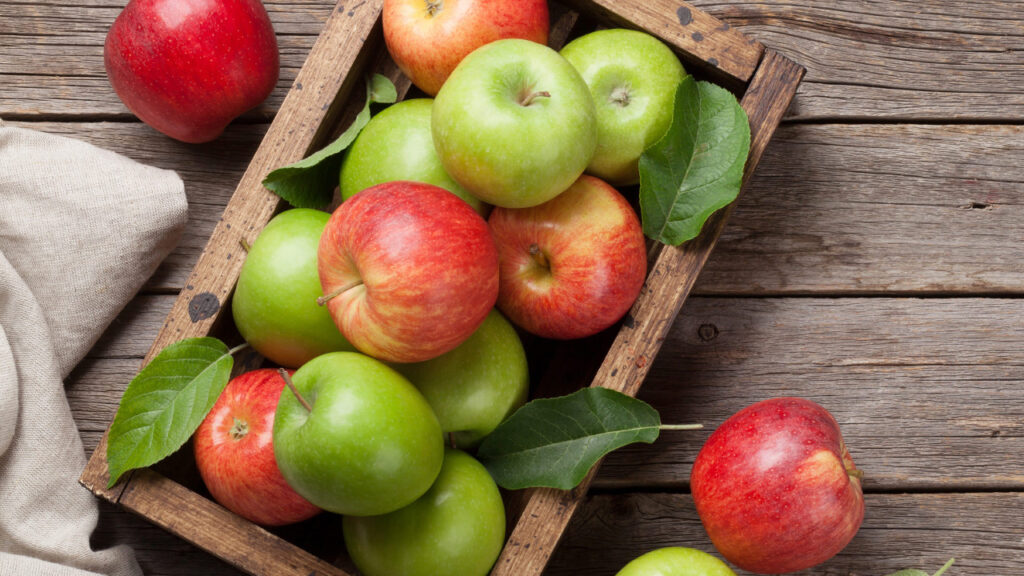
Apples are more than just a convenient snack or the star of a classic pie. They’re nature’s powerhouse, packed with nutrients and benefits that can transform your health when eaten daily. From boosting heart health to aiding weight management, apples have earned their reputation as a superfood. I remember my grandmother always saying, “An apple a day keeps the doctor away,” as she handed me a shiny red one from her garden. Little did I know how much truth lay in that old adage. Let’s dive into the science-backed, life-changing benefits of making apples a daily habit, exploring every angle with expert insights, practical tips, and a sprinkle of storytelling to keep it real.
A Nutritional Powerhouse in Every Bite
Apples are like nature’s multivitamin, delivering a bundle of nutrients in a low-calorie package. A medium-sized apple (about 182 grams) contains roughly 95 calories, 4 grams of fiber, and a wealth of vitamins and antioxidants. The skin alone is a treasure trove of nutrients, so don’t peel it! According to Healthline, apples are rich in fiber, vitamin C, and polyphenols—plant compounds with potent health benefits. My first encounter with this was during a farmers’ market visit when a vendor explained how the antioxidants in apples could rival a cup of green tea. Intrigued, I started incorporating them daily, and the results were undeniable—more energy, better digestion, and a brighter mood.
- Fiber: Keeps you full and supports gut health.
- Vitamin C: Boosts immunity and skin health.
- Polyphenols: Fight inflammation and oxidative stress.
Heart Health: Apples as Your Cardiovascular Ally
Your heart deserves some love, and apples are here to deliver. Studies show that eating apples daily can lower the risk of heart disease. A 2019 study from the American Journal of Clinical Nutrition found that consuming two apples a day reduced LDL (“bad”) cholesterol levels by up to 4%. The secret lies in pectin, a soluble fiber that blocks cholesterol absorption in the gut. I recall a conversation with a cardiologist friend who swore by apples as a natural way to keep his cholesterol in check, especially after indulging in holiday feasts. Pairing apples with a heart-healthy diet amplifies their effects, making them a simple yet powerful tool for cardiovascular wellness.
- Lowers cholesterol: Pectin reduces LDL levels.
- Blood pressure benefits: Potassium in apples supports healthy blood pressure.
- Antioxidant boost: Quercetin reduces inflammation in blood vessels.
Weight Management: A Sweet Solution Without the Guilt
Struggling to shed a few pounds? Apples might be your new best friend. Their high fiber content promotes satiety, helping you eat less without feeling deprived. A study from the Journal of Functional Foods showed that participants who ate apples before meals consumed fewer calories overall. I learned this trick during a weight loss journey when I swapped sugary snacks for apples. Not only did I feel fuller, but I also avoided the energy crashes that came with processed treats. Try slicing an apple and pairing it with a tablespoon of almond butter for a satisfying, nutrient-packed snack.
- Low-calorie: About 95 calories per medium apple.
- High fiber: Keeps you full longer, reducing snacking.
- Natural sweetness: Curbs sugar cravings without the guilt.
Gut Health: The Fiber-Fueled Advantage
A healthy gut is the foundation of overall wellness, and apples are a gut’s best friend. The pectin in apples acts as a prebiotic, feeding beneficial gut bacteria. According to Harvard Health, a balanced gut microbiome improves digestion, boosts immunity, and even enhances mental health. I once attended a nutrition workshop where the speaker likened apples to “fertilizer for your gut garden.” Since then, I’ve noticed that eating an apple daily keeps bloating at bay and my digestion on track. For maximum benefits, eat the skin, where most of the fiber resides.
- Prebiotic power: Pectin nourishes good bacteria.
- Regularity: Soluble and insoluble fiber prevent constipation.
- Microbiome balance: Supports a diverse gut ecosystem.
Brain Boost: Protecting Your Mind with Every Crunch
Could an apple a day keep cognitive decline away? Emerging research suggests yes. Apples contain quercetin, an antioxidant with neuroprotective properties. A 2020 study in the Journal of Alzheimer’s Disease linked apple consumption to a lower risk of Alzheimer’s and better cognitive function. I remember my mother, a teacher, always packing an apple in her lunch, claiming it helped her stay sharp during long grading sessions. Whether you’re studying for exams or navigating a busy workday, apples can give your brain a natural boost.
- Neuroprotection: Quercetin shields brain cells from damage.
- Memory support: Antioxidants improve cognitive function.
- Mood benefits: A healthy gut-brain axis enhances mental clarity.
Blood Sugar Control: A Sweet Way to Stay Balanced
For those managing diabetes or prediabetes, apples are a smart choice. Their low glycemic index (GI) means they don’t spike blood sugar levels rapidly. The fiber in apples also slows sugar absorption, promoting stable glucose levels. According to the American Diabetes Association, whole fruits like apples are a better choice than fruit juices for blood sugar control. I once helped a friend with prediabetes plan her meals, and swapping sugary drinks for apples made a noticeable difference in her energy and blood sugar readings.
- Low GI: Prevents blood sugar spikes.
- Fiber benefits: Slows sugar absorption.
- Portion control: One apple is a perfect serving size.
Skin and Hair: The Beauty Benefits of Apples
Want glowing skin and shiny hair? Apples have you covered. Their vitamin C content supports collagen production, essential for skin elasticity and hair strength. The antioxidants also protect against free radical damage, slowing signs of aging. A dermatologist I spoke with recommended apples as a natural way to hydrate skin from within, thanks to their high water content. I’ve personally noticed that my skin looks brighter when I eat apples regularly, especially when paired with plenty of water.
- Collagen boost: Vitamin C promotes youthful skin.
- Hydration: Apples are 85% water, keeping skin plump.
- Antioxidant protection: Fights premature aging.
Immune Support: Arming Your Body Against Illness
Apples are a year-round immunity booster. Their vitamin C and antioxidants strengthen your body’s defenses against infections. A study from the National Institutes of Health highlights vitamin C’s role in enhancing immune cell function. During flu season, I make it a point to eat an apple daily, often paired with a handful of nuts for extra protein. It’s a simple habit that keeps colds at bay and supports my body’s natural resilience.
- Vitamin C: Enhances white blood cell production.
- Antioxidants: Protect against oxidative stress.
- Year-round benefits: Easy to incorporate daily.
Comparing Apples to Other Fruits
To put apples’ benefits in perspective, let’s compare them to other popular fruits. This table highlights how apples stack up in terms of key nutrients and health benefits.
| Fruit | Calories (per 100g) | Fiber (g) | Vitamin C (mg) | Unique Benefit |
|---|---|---|---|---|
| Apple | 52 | 2.4 | 14 | High in pectin for gut and heart health |
| Banana | 89 | 2.6 | 8.7 | Rich in potassium for muscle function |
| Orange | 47 | 2.4 | 53 | Exceptional vitamin C for immunity |
| Blueberry | 57 | 2.4 | 9.7 | High in anthocyanins for brain health |
Apples hold their own with a balanced nutrient profile, making them a versatile choice for daily consumption. While oranges excel in vitamin C and blueberries shine for brain health, apples’ fiber and pectin give them an edge for gut and heart benefits.
Practical Tips for Adding Apples to Your Diet
Incorporating apples into your daily routine is easier than you think. Here are some creative, practical ways to enjoy them:
- Breakfast boost: Add diced apples to oatmeal or yogurt for a fiber-packed start.
- Snack smart: Pair apple slices with peanut butter or cheese for a balanced snack.
- Salad star: Toss chopped apples into salads for a sweet crunch.
- Baked goodness: Bake apples with cinnamon and a drizzle of honey for a healthy dessert.
- Smoothie base: Blend apples with spinach, banana, and almond milk for a nutrient-dense drink.
Pro tip: Choose organic apples when possible to avoid pesticide residues, as recommended by the Environmental Working Group. Store them in the fridge to maintain freshness and crispness.
FAQ: Your Apple Questions Answered
Are all apple varieties equally healthy?
All apples offer similar health benefits, but varieties like Granny Smith and Honeycrisp have slightly higher antioxidant levels, per WebMD. Choose based on taste preference, as consistency is key.
Can I eat apples if I have diabetes?
Yes, apples are diabetes-friendly due to their low glycemic index and high fiber. Stick to whole apples rather than juice to avoid sugar spikes, as advised by the American Diabetes Association.
Should I eat the skin?
Absolutely! The skin contains most of the fiber and antioxidants. Just wash thoroughly to remove any pesticides.
How many apples should I eat daily?
One to two medium apples per day is ideal for most people, providing benefits without excess calories.
Can apples cause digestive issues?
For most, apples aid digestion, but those with sensitive stomachs may experience bloating. Start with half an apple and monitor your body’s response.
Conclusion: Make Apples Your Daily Ritual
Apples are more than a humble fruit—they’re a gateway to better health, backed by science and centuries of wisdom. From supporting your heart and gut to boosting your brain and skin, the benefits of eating apples daily are undeniable. My own journey with apples started with my grandmother’s advice, and years later, I’m amazed at how such a simple habit has improved my energy, digestion, and overall well-being. Whether you’re munching on a crisp Fuji during a work break or baking a warm apple dessert, you’re investing in your health with every bite.
Ready to make apples a daily staple? Start small: grab an apple as your go-to snack, experiment with recipes, and notice how your body responds. Pair this habit with a balanced diet and active lifestyle for maximum impact. For more inspiration, check out Mayo Clinic’s tips on incorporating fruits into your diet. Here’s to crunching your way to a healthier, happier you!
